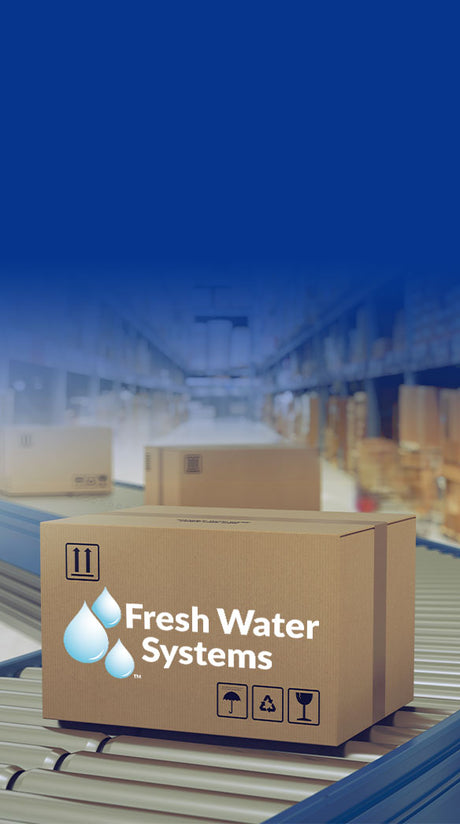Water Filtration & Treatment Systems
- Regular price From $279.00 Unit priceUnit price /UnavailableLow stock
Part #: PRO-41110-A
Everpure Residential
Regular price From $216.68 Unit priceUnit price /UnavailableVery low stockPart #: EV9271-51
Everpure Commercial
Regular price $675.00 Unit priceUnit price /UnavailablePart #: EV-QC7I-ESO7-TWIN
Everpure Residential
Regular price From $181.72 Unit priceUnit price /UnavailablePart #: EV9262-71
- Regular price $323.15 Unit priceUnit price /UnavailableVery low stock
Part #: PRO-41410-A
Everpure Residential
Regular price From $262.71 Unit priceUnit price /UnavailablePart #: EV9270-85
Everpure Residential
Regular price From $193.32 Unit priceUnit price /UnavailableVery low stockPart #: EV9855-00
- Regular price $905.10 Unit priceUnit price /UnavailableVery low stock
Part #: GRO-475B
-

Get a Quote
Fast, Free, Custom
- Regular price $289.99 Unit priceUnit price /Unavailable
Part #: 209529-50F
- Regular price $72.39 Unit priceUnit price /Unavailable
Part #: TL1-C302
- Regular price $34.25 Unit priceUnit price /Unavailable
Part #: LBS-10
- Regular price From $325.83 Unit priceUnit price /UnavailableLow stock
Part #: AN-0948-1190
- Regular price From $299.00 Unit priceUnit price /UnavailableVery low stock
Part #: PRO-41310-A
- Regular price $105.75 Unit priceUnit price /UnavailableLow stock
Part #: DDCR98
Viqua / Trojan
Regular price $650.00 Unit priceUnit price /UnavailableVery low stockPart #: VH150
- Regular price $680.40 Unit priceUnit price /UnavailableSold out
Part #: GRO-575M
Everpure Commercial
Regular price $95.45 Unit priceUnit price /UnavailablePart #: EV9275-60
Everpure Commercial
Regular price $309.68 Unit priceUnit price /UnavailablePart #: EV-QC7I-MH2
Southeastern Filtration & Equipment Systems
Regular price $168.05 Unit priceUnit price /UnavailableVery low stockPart #: SC-605-HW
Polaris Scientific UV
Regular price From $105.30 Unit priceUnit price /UnavailableVery low stockPart #: PSUV-1C-110V
Everpure Commercial
Regular price $415.96 Unit priceUnit price /UnavailableVery low stockPart #: EVMC2-SYSTEM
Everpure Residential
Regular price From $197.54 Unit priceUnit price /UnavailablePart #: EVRQDIY-54
-

MOST ORDERS OVER $89
FREE SHIPPING
Aqua-Pure - 3M Purification
Regular price From $154.34 Unit priceUnit price /UnavailableLow stockPart #: 5617904
- Regular price From $148.50 Unit priceUnit price /UnavailableVery low stock
Part #: WQCFU-T-11NF
Want to learn more?
Why filter water?
A water filter system not only gives water a fresh taste, but it also removes contaminants that are unsafe to drink or hard and unusable and clears your water of sediment and debris that leave a nasty taste or odor. 70% of your body is water, and it’s important to make sure that water is high-quality.
Types of Water Filter Systems
Reverse Osmosis Systems filter water through a semipermeable membrane that removes 98% of total dissolved solids (TDS) and washes the contaminants down the drain. An RO system comes in 3, 4, or 5 stages. These stages include sediment filters, carbon filters, and the semipermeable membrane. A reverse osmosis system requires a storage tank to hold the clean water until you need it.
Ultrafiltration Systems push water through a semipermeable hollow-fiber membrane, but it does not remove dissolved solids. Ultrafiltration leaves minerals in the water while filtering down to .25 micron. This system does not produce any wastewater.
UV Water Purifiers use a UV lamp to alter the DNA of bacteria and prevent them from reproducing. UV water treatment provides safe drinking water without adding chemicals but does not remove sediment or dissolved solids.
Water Softeners remove the minerals that make water hard and damage appliances like your dishwasher or water heater and create soap scum. Softened water makes your skin softer and laundry brighter.
Water Distillers boil water, which then turns to steam. As the water vaporizes, the contaminants are left behind and the fresh water recondenses. Distillers remove the widest variety of contaminants out of all filtration options.
Under-sink and Countertop Water Filters are point-of-use (POU) filters that provide clean drinking water from your tap using a variety of filtration methods.
Whole House Water Filtration Systems are point-of-entry (POE) systems that treat water before it enters your house. They provide filtered or softened water at every point in your home, from showers and sinks to dishwashers and washing machines.
Water Heater Filter Systems inhibit limescale build-up from damaging the heater.
Ceramic Water Filtration Systems filter out bacteria and cysts from water and come in a variety of carbon blends for additional contaminant reduction. These systems are economical and fit under your sink or on your kitchen counter.
Coffee, Tea, and Espresso Filters provide high-quality water to enhance hot or cold caffeinated beverages, making them rich with flavor and free of impurities.
Steam Filtration removes any impurities from water and ensures that no minerals damage your commercial steamer. Steam is all water, so it makes sense to filter that water before cooking.
Ice Filtration provides clear, clean ice. Ice is also 100% water like steam. Ice machines work best and ice tastes better when chlorine taste and odor are reduced and when scale is inhibited.
Food and Beverage Filtration give soda more flavor and fizz when chlorine and chloramines and other contaminants are reduced.
You have many options when choosing a filter system. These questions will help you decide which water filter system is best for you.
What’s your water source?
City water supply
Water treatment plants must meet EPA standards to maintain water quality and maintain maximum contaminant levels for safe drinking water. These plants use chemical disinfectants like chlorine that and chloramine could be harmful and make your water taste and smell bad. Even though major contaminants are removed at water treatment facilities, lead, pharmaceuticals, sediment, and other particulates can still enter your water supply through the pipes on the way to your home.
Well water
Water from a well collects mineral deposits, like iron, calcium, or magnesium, aquifers underground. These minerals are not a health hazard, but they do cause water hardness. Hard water creates scale that damages appliances and filmy residue that makes it difficult to clean and shower with. It’s the private well owner’s responsibility to ensure that the drinking water from a well is safe. Well water could also contain natural but dangerous contaminants like arsenic, nitrates, or bacteria. A UV system will protect your drinking water from harmful bacteria and viruses.
What’s wrong with your water?
What contaminants are in your water?
Conducting a water test will help you discover what harmful substances are lurking in your water. You can test your water at home or send your test to a lab for analysis. Learn how contaminants enter the water supply and what contaminants are most common in water.
Microscopic particles?
Contaminants like cysts, asbestos, and pesticides that are too small to see or even taste, can be removed using different filtration methods. Distillers and reverse osmosis (RO) systems have the greatest particle reduction and both remove total dissolved solids (TDS). RO filters water through a membrane, while distillation turns water into steam and leaves behind the contaminants. Ultrafiltration (UF) also removes microscopic contaminants, but not dissolved solids. If you prefer to leave beneficial minerals in your water, then an ultrafiltration system is the best option. A ceramic filter system reduces many of the same particles as a UF system.
Bacteria and Viruses?
A UV system disinfects water, and many waste treatment plants now use UV purification instead of chemical disinfection. A UV purifier uses ultraviolet light to deactivate small living organisms from water, but it does not remove sediment or improve tastes and odors.
Sediment?
Many filtration systems remove sediment, but if you are dealing with a lot of sediment in the water, a Rusco sediment filter is designed to accumulate and remove heavy dirt and debris from water.
Do you have hard water?
Hard water is caused by calcium and magnesium ions in the water. The scum and film it creates makes shampooing and cleaning difficult. Hard water also causes scale that can build up and damage your appliances. A water softener or salt-free conditioner removes water hardness minerals and prevents them from building up. Espresso filtration systems also require a softening element to provide smooth, rich espresso.
Does your water have a bad taste or odor?
Chlorine makes your drinking water taste like pool water, and sediment could leave your water tasting earthy. A fountain beverages, ice machines, and steam cookers, all provided water with a fresh taste.
What do you need a filtration system for?
Some filtration systems are designed specifically for either a point-of-use (POU) or point-of-entry (POE) in a home. POU drinking water systems install on your counter or under your sink to filter the water from your tap and feed your drinking faucet and refrigerator. POE systems are installed at the main water line and filter water for your whole house. If you need filtered water to protect your water heater, then you need a water heater filtration system. Other systems are made for restaurants, coffee shops, and other commercial locations. We provide commercial RO systems, UV systems, and food and beverage filtration systems for delicious flavor from cappuccinos, soups, and sodas.


![Everpure Insurice Single-i2000[2] Filter System EV9324-01](http://www.freshwatersystems.com/cdn/shop/files/utrztiegfhk5tcovg9vs_53da0678-f36c-4ace-acf3-c42bb0db19aa.jpg?v=1768208550&width=460)







![Everpure Insurice Twin-i2000[2] Filter System EV9324-01](http://www.freshwatersystems.com/cdn/shop/files/bqdrthakvd33zopyemkx.jpg?v=1768208729&width=460)










![Everpure QC7i Single-MH[2] System](http://www.freshwatersystems.com/cdn/shop/files/jhoq2pencvni7crdhe6m.jpg?v=1768210825&width=460)



![Everpure H-54 Drinking Water Filter System - H-54 System [Retail Package]](http://www.freshwatersystems.com/cdn/shop/files/ehnhupwjrzrbxguvgfvz_ebf840b1-c01b-4155-b2f0-50177559b9e1.jpg?v=1768212986&width=460)


![Aqua-Pure Easy Complete Drinking Water System - Complete [Faucet & Install Kit]](http://www.freshwatersystems.com/cdn/shop/files/x7tc5kwn7mdkx6lpuga0.jpg?v=1768212078&width=460)
